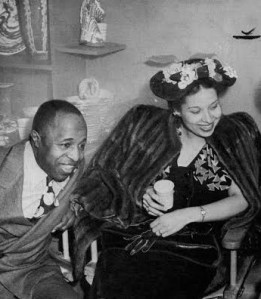 My question is “didn’t Black people ever watch old time radio?” I have begun to realize the magnitude of commercialism and how it played into Blacks being ignored in this world in the early 1900s. While researching African-Americans and their relationship to Old Time Radio I did a Google search for “Old Time Radios”. The search engine game me dozens of images of families sitting around the radio listening to a program. Some actually were looking at the radio as if it was a television. However, none of these families were Black. I am trying to wrap my head around the idea that despite all the African-Americans in America at the time, there was little representation in the radio industry. According to J. Fred MacDonald “the industry in its so-called Golden Age offered only limited opportunities for black men and women to develop.” Even though there was a huge need for personnel.
My question is “didn’t Black people ever watch old time radio?” I have begun to realize the magnitude of commercialism and how it played into Blacks being ignored in this world in the early 1900s. While researching African-Americans and their relationship to Old Time Radio I did a Google search for “Old Time Radios”. The search engine game me dozens of images of families sitting around the radio listening to a program. Some actually were looking at the radio as if it was a television. However, none of these families were Black. I am trying to wrap my head around the idea that despite all the African-Americans in America at the time, there was little representation in the radio industry. According to J. Fred MacDonald “the industry in its so-called Golden Age offered only limited opportunities for black men and women to develop.” Even though there was a huge need for personnel.
 Of course, there were Blacks working in radio as janitors, or electrical assistants and even an announcer or two. They had to come in the “other” door, though. And there were Blacks performing on the radio, such as my father, Eddie Green, who became Rudy Vallee’s protege’ or Eddie “Rochester” Anderson from the Jack Benny program. My father was evidently so funny that Rudy Vallee would feature Eddie over and over. Then there were shows that were hugely popular with everybody (maybe not the NAACP), such as, Amos n Andy. People everywhere literally stopped what they were doing to listen to this program. Eddie was the lawyer, Stonewall in this program. There must have been some Blacks sitting in front of their radios, or if they did not have one a person could stand in front of their local storefront and listen to the broadcasts. Yes, I am beginning to really see how segregation kept Black people “out of the picture”, except in some rare instances. I mean we were THERE.
Of course, there were Blacks working in radio as janitors, or electrical assistants and even an announcer or two. They had to come in the “other” door, though. And there were Blacks performing on the radio, such as my father, Eddie Green, who became Rudy Vallee’s protege’ or Eddie “Rochester” Anderson from the Jack Benny program. My father was evidently so funny that Rudy Vallee would feature Eddie over and over. Then there were shows that were hugely popular with everybody (maybe not the NAACP), such as, Amos n Andy. People everywhere literally stopped what they were doing to listen to this program. Eddie was the lawyer, Stonewall in this program. There must have been some Blacks sitting in front of their radios, or if they did not have one a person could stand in front of their local storefront and listen to the broadcasts. Yes, I am beginning to really see how segregation kept Black people “out of the picture”, except in some rare instances. I mean we were THERE.
 Today, If you look up Old Time Radio (OTR), not the Beyonce’ concert, you will get a lot of information about all the White radio suspense, cowboy, comedy and horror shows.
Today, If you look up Old Time Radio (OTR), not the Beyonce’ concert, you will get a lot of information about all the White radio suspense, cowboy, comedy and horror shows.
Old Time Radio shows produced by Blacks got a toehold in maybe the late 30s. The one I have researched so far, though got its start on June 27, 1948. Mr. Richard Durham began a radio program titled “Destination Freedom”. Now….. if you look up OTR shows online you will get a lot of sites that post lists of shows and you will get sites that let you listen to lots of shows. Until two days ago I hadn’t found one site that had a list of a Black OTR program.
Two days ago I found one that has a list and lets you download shows of Mr. Durham’s Destination Freedom. Old Time Radio Downloads. They have won my heart. They actually have clippings of each episode of “Destination Freedom” for my listening pleasure. I love them. Maybe some day this show will appear in the internet search engines under OTR, Old Time Radio, that is.
https://www.oldtimeradiodownloads.com/historical/destination-freedom/the-making-of-a-man-1948-07-25
Hey, thanks, for stopping by.

 Inspire someone today. I chose to write a book “Eddie Green The Rise of an Early 1900s Black American Entertainment Pioneer” to inspire my grandson. He was six when I came up with the idea, he is twenty-six today and the book just published in July of this year.
Inspire someone today. I chose to write a book “Eddie Green The Rise of an Early 1900s Black American Entertainment Pioneer” to inspire my grandson. He was six when I came up with the idea, he is twenty-six today and the book just published in July of this year. My desire to inspire my grandson with his great-grandfather’s story morphed into wanting to inspire any person who thinks “they can’t .” So I was blown away with the interest generated by this book in the Nostalgia field. I have discovered that a lot of people knew about, remembered and have actually seen my father perform. I have been made aware of the fact that there are young people who are fascinated with success stories from the 1900s, for the very reason I wrote the book, inspiration. Also, I have happily realized the interest this book can garner in the Black community as a success story of a Black man, both personally and professionally, in a time of great racial discord.
My desire to inspire my grandson with his great-grandfather’s story morphed into wanting to inspire any person who thinks “they can’t .” So I was blown away with the interest generated by this book in the Nostalgia field. I have discovered that a lot of people knew about, remembered and have actually seen my father perform. I have been made aware of the fact that there are young people who are fascinated with success stories from the 1900s, for the very reason I wrote the book, inspiration. Also, I have happily realized the interest this book can garner in the Black community as a success story of a Black man, both personally and professionally, in a time of great racial discord. The latest good news is that the biography I have written about my father, Eddie Green, will now be featured in the Schomburg Center for Research in Black Culture in New York.
The latest good news is that the biography I have written about my father, Eddie Green, will now be featured in the Schomburg Center for Research in Black Culture in New York.
 as he did in his movie One Round Jones.
as he did in his movie One Round Jones.  If it wasn’t for Edward, I may not have written a book about my father.
If it wasn’t for Edward, I may not have written a book about my father.
 Get ready, get ready, get ready. I am following in my father’s footsteps. On Sunday, July 31, at 7:30PM, I am going to be interviewed on an internet radio station with regard to my new book! Eddie, my father, was an Old Time Radio icon who appeared for ten years on the Duffy’s Tavern radio show, as well as appearing on The Radio Hall of Fame, Stage Door Canteen and many others. In his own words he was “one who knows the radio business.” In a letter he wrote to a radio station back in 1938 he introduced himself like this: “I am known in big time radio from coast to coast.”
Get ready, get ready, get ready. I am following in my father’s footsteps. On Sunday, July 31, at 7:30PM, I am going to be interviewed on an internet radio station with regard to my new book! Eddie, my father, was an Old Time Radio icon who appeared for ten years on the Duffy’s Tavern radio show, as well as appearing on The Radio Hall of Fame, Stage Door Canteen and many others. In his own words he was “one who knows the radio business.” In a letter he wrote to a radio station back in 1938 he introduced himself like this: “I am known in big time radio from coast to coast.”

